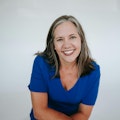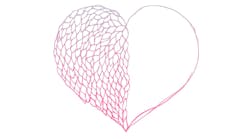Let’s stop practicing "halfway hygiene"
Overworked… undervalued… disregarded… belittled… disrespected…
These words describe how many hygienists feel about their careers. Our profession has grown exponentially over the last 20 years, but has the industry made room for our growth? Or are we still trying to stuff all of our knowledge into the same old prophy?
For a long time, I left the office after a full day and felt bad. Not just tired or sore, but defeated. I struggled to pinpoint the “what” or the “why” of that feeling. Then it hit me. Every day I was doing my absolute best with my patients with the time and equipment available. I was giving it my all, but I knew that my all wasn’t all there was. I was stuck in what I now term “halfway hygiene.”
Halfway hygiene is the concept that as hygienists are extremely knowledgeable and aware of what a difference we can make, but we are often pigeonholed into the scale-and-polish prophy model. We see hygienists burning out and leaving hygiene or accepting their minimized role and hating their career.
Burnout
There are entire Facebook groups dedicated to how burned-out people are feeling. Authors Emily and Amelia Nagoski, in their book, Burnout: The Secret to Unlocking the Stress Cycle, say that burnout happens when we feel emotional exhaustion, decreased sense of accomplishment, and depersonalization.1 That was it! That was how I was feeling. I knew I could do more—saliva testing, biofilm management, airway evaluation, nutritional counseling—the list goes on and on, but here I was doing bloody prophies and whitening teeth every 50 minutes.
Where is the pivot point? I’ve discussed this concept with many hygienists, and while many can relate, I’m happy to report that there are indeed hygienists who are practicing wholehearted hygiene. But it feels like there are still so many speed bumps and roadblocks to maneuver until the whole profession can get there. Many of us feel hampered by licensure and state laws, insurance and coding, dentists, and certainly by patients. Some days it all feels insurmountable.
Licensure and state laws
As a military spouse, licensure and differing state laws have been a challenge as I’ve moved my career with my husband’s service to our country. When I drive 25 miles south from my house and cross the border into North Carolina, I can no longer practice dental hygiene since I don’t hold that state license, and if I did, I wouldn’t be allowed to administer anesthesia or use a laser. I’m not sure how those brain cells fell out when I crossed the border, but it sure is frustrating not to be able to utilize all of my skills simply because I entered a new state.
While the concept of national licensure and standardization of scope of practice sounds heavenly, it’s not as simple as waving a magic wand and making us all equal with our skill sets. The good news is, it is getting easier to transfer licenses from state to state (at least in some areas), and there are continuing education courses that can be taken to learn skills you weren’t allowed to do in your state. But for now, I still dream of a day when driving across a state line doesn’t prevent me from practicing and using all my knowledge to serve patients.
Insurance and coding
For longer than I care to admit, I turned a blind eye to dental codes. That was the job of the front desk team. After all, if it were important, I would have learned about it in dental hygiene school, right? I just did what the patient needed and wasn’t about to let a code or insurance dictate what I should do. Little did I understand the power of coding. If used properly, it not only helps with documentation, but it can also help us move our profession forward. A dental code isn’t just about billing, as I had thought; it’s about establishing all that we are doing in an appointment and then using that information to make data-driven decisions about patient care. If a code has never been used, reimbursement for that code will be difficult in the present and future.
Patti DiGangi, BS, RDH, founder of Beyond Oral Health,2 has been speaking about dental coding for more than 30 years and has seen coding evolve, albeit slowly, as our practice has expanded. She and a team of hygienists attended the American Dental Association Code Maintenance Committee annual meeting. They not only presented new dental codes for consideration but also asked for a dental hygienist to hold a position on the coding board. While they weren’t successful in getting an RDH on the board, or getting other codes applied for acceptance in 2020, they did get the verbiage concerning oral cancer screenings changed from optional to making it a must-do. These efforts may seem small, but they are necessary for progress.
Dentists
Relationships between dentists and their teams are of a dynamic nature. The COVID-19 pandemic has shined a light on fissures that existed in team relationships and turned them into canyons. In social media forums, hygienists report feeling unsupported, disrespected, and undervalued by their dentist employers. American Dental Hygienists’ Association CEO Ann Battrell, MSDH, RDH, offered this perspective at ADA’s Health Policy Institute: “Most dentists are unaware of all the things hygienists can do in their home states. When you only think about ‘they just do this,’ you are missing the entire scope of what a hygienist can do to really improve the health of the patients.”3
I have worked for amazing dentists who encouraged me to build a hygiene program that met the latest evidence-based research for both the patients’ needs and my needs. Alternatively, I’ve also been in practices where dentists have asked me to practice outside my scope one minute, and then questioned my professional judgment the next. This is frustrating, as you can imagine. I wanted to rip off my gloves and say, “If you want me to do more to make your job easier, then support dental hygienists and stop fighting expansions in our scope of practice!” It’s difficult to feel empowered for change when hygienists don’t have control over our profession in most states.
Patients
Patients—they can make or break a day. They are the motivation that brings us back into the office every day. We love them, we care for them, and yet many of them still have no idea who we are or what we actually do. I mean, they know our names and the names of our kids, they keep track of our lives, but do they know what we went through to earn that RDH license? Do they know how freaking smart we really are? For a long time, Hollywood portrayed the dental hygienist as the one who broke up a marriage or the flaky friend of the heroine. To this day, I have family members who don’t know the difference between dental assistants and dental hygienists. To them, we are all “dental nurses” or “techs.”
Sometimes it feels so defeating to update a patient’s medical history only to have them reveal to the dentist during the hygiene exam that they had a stroke three months ago. Or to have them ask for “just a quick cleaning” because they are running late to a meeting. Thankfully, there is more research and attention now on the oral-systemic link. Finally, patients are tuning in to oral health as a resource for their overall health and are starting to believe their dental providers when we say healthy gums don’t bleed. This is a huge success and helps the general public value their dental appointments as essential and not optional.
While it’s easy to cast blame at licensure, insurance companies, dentists, and patients, I have come to realize that the biggest obstacle to wholehearted hygiene is each of us individually—how we view ourselves, our abilities, and our worth. For too long we have allowed ourselves to think we are “just” a hygienist and that we have no control over how we practice because we are not autonomous.
Each of us needs to take time to reflect on our why and on our values, strengths, and passions. Stop thinking that perfection is the goal. The glorious thing about this new era in dental hygiene is that there are numerous paths to explore. It’s not just about seeing eight to 10 patients a day for the single-practitioner dentist in our hometown. Hygienists can make an excellent living in public health, myofunctional therapy, dental/medical integration, specialty practices…and in the process find our own personal wholeness.
References:
- Nagoski E, Nagoski A. Burnout: The Secret to Unlocking the Stress Cycle. Ballantine Books; 2019:xi.
- Digangi P, Hill L, Beeson P. Become part of the movement that will change the future of healthcare! Beyond Oral Health. https://beyondoralhealth.com
- Economic impact of COVID-19 on the dental care sector: Insights from data for week of September 7. American Dental Association Health Policy Institute. Accessed November 10, 2020. https://www.ada.org/en/science-research/health-policy-institute/publications/webinars/inights-from-the-week-of-september-7
About the Author

Amanda Hill, BSDH, RDH, CDIPC
Amanda Hill, BSDH, RDH, CDIPC, is an enthusiastic speaker, innovative consultant, and award-winning author who brings more than 25 years of clinical dental hygiene and education to dentistry. Recipient of ADS’s Emerging Infection Control Leader award and an active participant with the advisory board for RDH magazine, DentistryIQ, and ADS’s Infection Control in Practice Editorial Review Board and membership committee, Amanda (also known as the Waterline Warrior) strives to make topics in dentistry accurate, accessible, and fun. She can be reached at [email protected].

